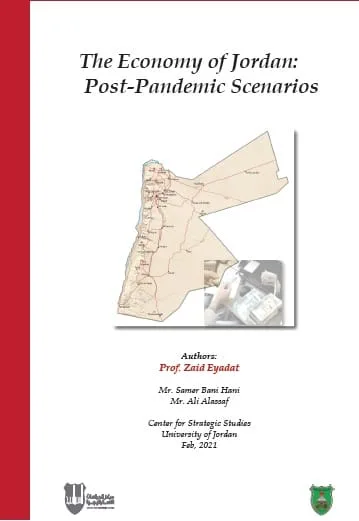March 08, 2021 Introduction
The COVID-19 pandemic has caused one of the worst economic crises since the Great Depression, posing severe economic and social challenges not only to Jordan but to the entire world, and although global economic activity is growing again, it is unlikely that we will return to business as usual for the foreseeable future. The pandemic has taken a heavy toll on lives, pushed millions into extreme poverty, and is expected to cause lasting scars that will push activity and income levels below pre-pandemic trends for an extended period of time. 150 countries have closed all schools and imposed cancellations of gatherings and events, and more than 80 countries have closed all workplaces to contain the outbreak of the virus. Widespread travel restrictions have been imposed, mandatory lockdowns have been imposed, along with social distancing. As a result, economic activity on a global scale has significantly shrunk, accompanied by fluctuations in financial markets, and a sharp drop in prices for oil and industrial metals. economies (emerging market countries and developing countries). However, even before the pandemic, the rapid buildup in these economies referred to as the “fourth wave” of debt buildup raised concerns about debt sustainability and the possibility of a financial crisis. The COVID-19 pandemic caused huge production losses of around 5% in 2020 in the MENA region. The regional economy in the Middle East and North Africa is expected to recover only modestly in 2021, expand by 2.1%, a weaker number than previously expected, and accelerate to 3.1% in 2022. Domestic political tensions and geopolitical pressures remain a threat to the growth and undermining greater trade integration. On the other hand, geopolitical tensions have eased in some respects, including the normalization of relations between Israel and some Gulf Cooperation Council countries. Tensions between Iran and the United States continue to escalate. The level of political uncertainty is high in many economies of the Middle East and North Africa (Lebanon, Tunisia and the Republic of Yemen). Ceasefire agreements in Libya and the Republic of Yemen provide an opportunity to improve regional security and reduce the rise in domestic food insecurity. In the long term, failure to improve political stability will be detrimental to economic growth, and progress in implementing structural reforms must be maintained, especially in some oil-importing countries such as Jordan. It is unclear whether the pandemic will help accelerate these reforms or rather hinder them as policy priorities change. Moreover, while recent measures have helped mitigate the collapse in financial output, they will need to be carefully managed and pulled to avoid paving the way for future instability. Changes in financing terms pose additional risks to economies with large current account deficits, albeit with low FDI inflows. In some economies such as Jordan, urgent balance of payments needs in 2020 have already led to rapid financial assistance from the International Monetary Fund, and these circumstances have necessitated the Center for Strategic Studies (CSS) at the University of Jordan to adopt effective initiatives towards supporting policy and decision makers: CSS takes steps Concrete towards improving and strengthening its analytical and research capabilities. Thus, adding the socio-economic profile to its primary mission will add to the main work of the Center for qualitative research, hence the launch of the Strategic Economic Policy Analysis Unit (SEPAU). Post-Pandemic Scenarios”, with the aim of providing an early warning structure to prevent chronic economic and social deficits that can persist for many years in the post-COVID-19 period. CSS has been a leading institution in evaluating and designing evidence-based policy interventions. is a center for research, analysis and evaluation of public policy; which continues to be recognized as the best center of excellence in the MENA region since 2016, according to the Global Go to Think Tank Index (last updated June 2020) as part of the University of Pennsylvania’s Think Tanks and Civil Societies Program (TTCSP). This achievement was achieved after continuous efforts that led to CSS being ranked first in 2016, 2017, and 2018 among 507 research institutions in the MENA region.
Director of the Center for Strategic Studies at the University of Jordan, Mr. Zaid Eyadat



